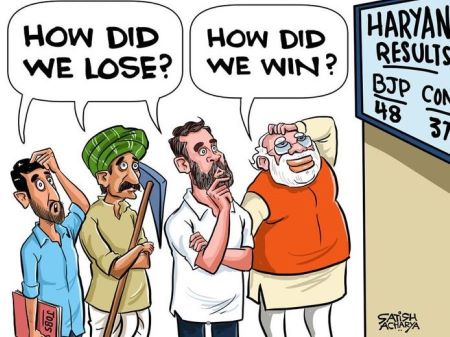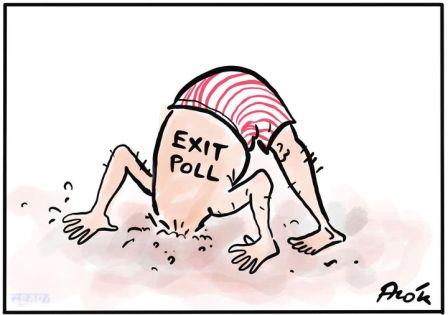The recent assembly elections in Haryana and Jammu and Kashmir reveal stark contrasts in political strategies and outcomes, particularly for the Congress party.
THE LANDMARK OUTCOMES of the assembly elections in Haryana and Jammu and Kashmir hold vital lessons for all political parties. In Haryana, the Congress has demonstrated how to snatch defeat from the jaws of victory, while the high turnout and decisive mandate in Jammu and Kashmir reflect the people’s aspirations for normalcy.
There is no doubt that the final result of the Haryana assembly elections has surprised many, even among the Bharatiya Janata Party, and has given a stunning shock to Congress supporters. However, these results have laid to rest several myths. Despite the difference in voting percentage of less than one, Congress has decisively lost the election with no chance of maneuvering. The defeat comes even though it increased its votes by about 10 percent compared to the previous assembly elections. It has shattered the myth that no party can come to power for a third consecutive term in North India.

It is easy to look back and delve into the reasons that could have led to the unexpected outcome rather than predict the result of any complex election. Nevertheless, it is important for political parties and commentators to analyze and learn from the outcome.
There is absolutely no doubt that the Congress must take the blame for its defeat in Haryana, where it managed to snatch defeat from the jaws of victory.
After the BJP’s slide in the previous elections, when it could not secure an absolute majority and had to seek the help of the JJP to form the government, and in the recently concluded Lok Sabha elections, where it halved its tally from 10 to five seats, the party appeared to be on a downward slope. This seemingly lulled the Congress into complacency, leading it to believe that victory was within easy reach.
Despite a favorable environment, Congress has once again demonstrated its expertise in snatching defeat from the jaws of victory, raising critical questions about its future and electoral strategies.
The open divisiveness within the Congress, with its leaders Bhupinder Singh Hooda and Kumari Selja making no secret of their animosity, alongside other leaders like Birender Singh and Randeep Singh Surjewala vying for the top post, was evident.
Hooda, of course, received the lion’s share of candidates backed by him, which prompted Selja to distance herself from the campaign for most of the election cycle. None of the party leaders actively campaigned across the state to garner votes for party candidates.
All the major issues raised by the Congress, pertaining to farmers (kisan), soldiers (jawan), and wrestlers (pehelwan), resonated with Jats, while other communities felt ignored, potentially leading to the consolidation of non-Jat communities in favor of the BJP. The dominance of Hooda as the Jat leader and the neglect of the OBC face, Selja, could have contributed to this situation.
 Credit is also due to the BJP and its workers, who worked relentlessly despite adverse reports about the possible outcome. The party took proactive steps to overcome the anti-incumbency factor, including a change of chief minister and the dropping of one-third of its sitting MLAs. The party also managed to project its achievements by reaching out to grassroots workers through its organized cadre, while Congress merely relied on anti-incumbency.
Credit is also due to the BJP and its workers, who worked relentlessly despite adverse reports about the possible outcome. The party took proactive steps to overcome the anti-incumbency factor, including a change of chief minister and the dropping of one-third of its sitting MLAs. The party also managed to project its achievements by reaching out to grassroots workers through its organized cadre, while Congress merely relied on anti-incumbency.
One of the most important lessons that the Congress must learn is not to rest on its laurels and to prepare for elections with a strategic plan in mind. The party will now approach elections in Maharashtra and Jharkhand with lowered morale, while the BJP appears to have laid to rest the ghosts of the Lok Sabha elections, in which it faced a decline in performance.
The elections for the Jammu and Kashmir Assembly were even more significant from a national perspective. Coming after a gap of 10 years and five years after the abrogation of Article 370 and the conversion of the state into a Union Territory, the elections can be considered a landmark in the electoral history of the region.

The absolute victory of the alliance between the National Conference and Congress has placed Jammu and Kashmir on the path to political stability and normalcy. It is primarily a victory for the National Conference, which swept the valley, but the credit must also go to the central government for holding largely violence-free elections with an impressive voter turnout. While it may be a defeat for the BJP, it is a victory for democracy in the country.
It will now depend on how the central government, through the lieutenant governor, deals with the elected government and how soon it restores statehood to Jammu and Kashmir, which is the core demand of political parties. It would be in the best interest of the country if both sides work in harmony rather than acrimony to further improve the situation in Jammu and Kashmir.
Meanwhile, after the incorrect predictions by exit polls in the recent Lok Sabha elections, the projections of exit polls for the assembly elections in Haryana and Jammu and Kashmir have also proven completely wrong, raising questions about the credibility of such exercises.
 Since none of those organizing such exit polls disclose the methodology through which they arrive at their conclusions, it is evident that the numbers are often based on conjectures and assumptions. Yet, as TRP figures show, there is a significant surge in television viewership when exit polls are announced.
Since none of those organizing such exit polls disclose the methodology through which they arrive at their conclusions, it is evident that the numbers are often based on conjectures and assumptions. Yet, as TRP figures show, there is a significant surge in television viewership when exit polls are announced.
But apart from the exit polls, all major media houses, journalists, and political commentators also found themselves on the wrong foot regarding the results favoring the Bharatiya Janata Party in Haryana, where Congress was believed to be on the verge of a landslide victory. Almost all exit polls had predicted a hung assembly in Jammu and Kashmir, where the National Conference, in alliance with Congress, gained an absolute majority.
Also Read: Democracy Prevails in Jammu and Kashmir: A Message to Pakistan
The lesson to be learned is that predicting the outcomes of elections should be left to psephologists or experts in the field, rather than media houses and journalists who do not use any methodology and rely on their hunches and personal analyses of the ground situation. ![]()
Disclaimer : PunjabTodayNews.com and other platforms of the Punjab Today group strive to include views and opinions from across the entire spectrum, but by no means do we agree with everything we publish. Our efforts and editorial choices consistently underscore our authors’ right to the freedom of speech. However, it should be clear to all readers that individual authors are responsible for the information, ideas or opinions in their articles, and very often, these do not reflect the views of PunjabTodayNews.com or other platforms of the group. Punjab Today does not assume any responsibility or liability for the views of authors whose work appears here.
Punjab Today believes in serious, engaging, narrative journalism at a time when mainstream media houses seem to have given up on long-form writing and news television has blurred or altogether erased the lines between news and slapstick entertainment. We at Punjab Today believe that readers such as yourself appreciate cerebral journalism, and would like you to hold us against the best international industry standards. Brickbats are welcome even more than bouquets, though an occasional pat on the back is always encouraging. Good journalism can be a lifeline in these uncertain times worldwide. You can support us in myriad ways. To begin with, by spreading word about us and forwarding this reportage. Stay engaged.
— Team PT

